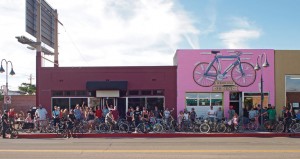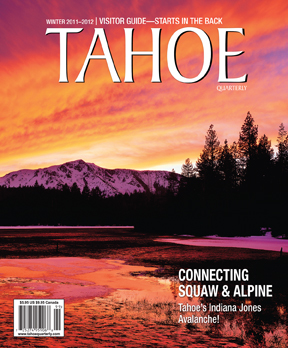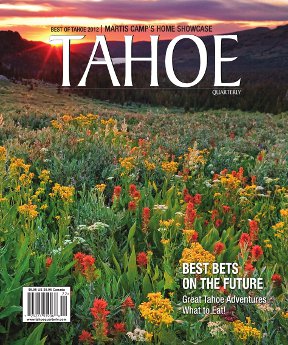Reno’s Cycling Scene

A sliver of Reno’s cycling community assembled at Reno Bike Project for its 2012 Hot August Bikes Ride. Photo courtesy Reno Bike Project
The power of the pedal is taking hold in the Biggest Little City
Written by Brad Rassler
It’s a warm spring day in Reno; the tulips are up, the pear trees are blossoming and a gaggle of cyclists—road bikers, mountain bikers and hipsters riding fixed-gear rigs—have sprung forth like so many butterflies freshly freed from their chrysalises.
There is a vision for Reno as a cycling-centric haven, as cycling-friendly legislation, new businesses with a health-conscious workforce and bi-wheeled aficionados converge on the Biggest Little City. The region’s governmental, business and planning leaders are in violent agreement about the importance of cycling as key to human-powered transportation here. All want more of the area’s residents to become pedal pushers.
Back to Bikes
They need little pushing. As the cost of gas increases, as streets become safer for riding, as people young and old recognize the health boon conferred by riding a bike or as those whose worldview has become synonymous with the flexibility, freedom and zero carbon footprint of pedaling, more people than ever are taking to bikes in the Reno area. Last year, Bicycling Magazine ranked Reno the 42nd most bike-friendly city in the U.S.
Actually, it might be more accurate to say Reno is experiencing a cycling resurgence—but you’d have to hark back to the turn of the twentieth century, prior to the advent of the car to find a similar degree of interest. The Reno Wheelmen, the local racing club, formed in 1896 and produced thoroughbreds who bested competitors from California’s big city cycling teams, from Sacramento and beyond. The Wheelmen had a marching band and stadium and races drew upwards of 3,000 fans.
The town has had its fair share of cycling luminaries through the years. Framebuilder Roland della Santa has forged his world-class lugged steel frames here since 1970—the same frame ridden by a young Greg LeMond, who commuted from his home in Washoe Valley to Wooster High and eventually to Europe, where he is currently the only American (Lance Armstrong’s wins have been vacated) to have won the Tour de France—thrice. Olympian Inga Thompson’s career started here, and Mountain Bike Hall of Famer Max Jones was given his first off-road bike by a local shop owner.
Riding to Community
But these days, it’s perhaps less about the race and more about the ride.
“Commuting to work ten years ago, you’d see the same three guys every morning, and you’d give them the wave. Now, I see so many people riding around that if I waved at all of them I’d never have my hands on the handlebars.”
That’s longtime resident Casey Clark, who teaches a bike-building class at Reno’s Academy of Arts, Careers, and Technology. He’s also a staffer at the Reno Bike Project (RBP), a community shop that arrived on the scene in 2006. Like a hub motor on a tricycle, RBP has boosted Reno’s cycling collective consciousness and, according to Terry McAfee, the founder of the Nevada Bicycle Coalition, has been a tour de force in putting more people on bikes in Reno. RBP’s 2,850 square foot retail outlet sells used bikes, houses a gallimaufry of used parts and offers eight fully outfitted workstations for public rent ($3 an hour), along with a full-time mechanic who’s available to help lace a wheel or loosen a frozen bottom bracket cup.
The Reno Bike Project’s tendrils extend well beyond the shop’s confines: The group hosts a bike art show, sponsors cycling programs for at-risk youth and the economically disadvantaged, and actively lobbies for more bike lanes and laws to keep cyclists safe. Last year, RBP brought two full-time Americorps Vista volunteers onboard to spearhead these outreach programs and more.
“From the start, people have supported us,” says Reno native and RBP cofounder Noah Silverman. “We were young and dynamic and really put ourselves out there, and it caught on.
“What has made us so successful?” he muses. “It’s either our energy and the image that we built for ourselves or the fact that our goal is philanthropic in essence—we’re here to make Reno a better place. And it’s the fact that the young people of this town are ready to see change—and the change that’s happening in Reno is in large part to people having seen different things and wanting that for this community.”
Here’s Eric Raydon, a principal of Marmot Development, whose real estate firm is investing in Reno’s Midtown and Bungalow Districts, in large part due to the bikeability and walkability of those neighborhoods:
“What we’re seeing in Reno is an extension of a trend we’re seeing nationally: the urbanization of America where the exurbs and suburbs are beginning to fall out of favor in an era of high gasoline prices as far as the eye can see.”
Tim Healion, the father of the Tour de Nez stage cycling race, and its successor, September’s planned Tour de Nez-Vada, agrees. “I think it’s the evolution of sustainable living, as appropriate participation as a human being, as a species. People are moving back to the cities because it’s practical. The cost of gas is higher, the environmental movement is more in your face—there’s more information about how it’s fun to ride a bike, how it’s healthier, how it leads to cleaner, healthier living, how it impacts the environment, lessens traffic problems.”
And McAfee, whose Nevada Bicycle Coalition was instrumental in the passage of SB248, also known as the 3 Foot Passing Law, has noticed more respect from motorists.
“It’s been years since a driver threw a beer can at me,” he says. McAfee lauds Reno’s proactive City Council and an eager-to-please Regional Transportation Commission (RTC), both of which have restriped or created nearly 100 miles of bike lanes or paths in the last four years. The agency is intent on quadrupling that number in the years ahead, according to its Bicycle and Pedestrian Master Plan.
“If we can provide opportunities for people to get out of their cars and walk or bike or ride transit, then that certainly has air quality benefits, community health benefits and it reduces traffic congestion,” says Amy Cummings, RTC’s director of planning.
Economic Wheels
That infrastructure also appeals to the region’s current and future business community.
“Being bike friendly is important to many of the companies we work with, especially those that are smaller and more entrepreneurial,” says Mike Kazmierski, the executive director of the Economic Development Authority of Western Nevada (EDAWN). “Additionally, companies involved with technology or the creative class often consider biking an important component of the overall quality of life.”
Kazmierski says EDAWN is in talks with two biking companies looking to relocate to Northern Nevada, which would buttress the already-rich ecosystem here, with its 14 bicycling retail indies or outlets, and one of the country’s largest bike part wholesalers.
Meanwhile, cycling events and interest groups have sprung up all over the Truckee Meadows. Reno’s Kiwanis Club has refurbished thousands of bikes and donates nearly 600 each year—with helmets—to area youths. Participation in the Rotary Club’s Edible Pedal, an organized ride featuring stations doling out locally grown and prepared food, doubled in two years. Up at the University of Nevada, Reno, the Campus Cycling Coalition is lobbying for a bike-friendly campus for the student body, now 18,000 strong and growing. The Poedunks, a mountain biking club, caretake Peavine Mountain’s rich skein of single-track trails, and the Tuesday Night Ride Group is an at-large posse of 400 or so mountain bikers and beer aficionados who meet Tuesday evenings to ride the area’s trails and then craft brews.
Major stakeholders like Raydon count on cycling to continue to burgeon here.
“One of the reasons we chose Reno-Tahoe as a place to invest and live in is because it’s got these world-class geographic features—sort of an embarrassment of riches in terms of its location and geography. We have felt for awhile that Reno is the next great American city—we think it’s the next Denver. So we think that the renaissance or rebirth that you’re seeing here is a very organic process that makes perfect sense for this region to become one of the cycling meccas, not only of North America, but the world—just because of the clean air, the high altitude, the long cycling season and the robust mountain biking, road biking and touring offerings here. It’s pretty endless.”
Brad Rassler is a Reno-based writer and cyclist. You can find more of his work at www.sustainableplay.com






